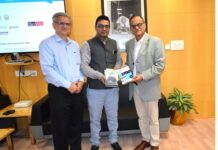
Digital India has been envisioned as an ambitious umbrella programme to transform our country into a digitally empowered society and knowledge economy. It comprises of various initiatives under the single programme each targeted to prepare India for bringing good governance to citizens through synchronized and co-ordinated engagement. Although the campaign was unveiled by the Prime Minister, Mr Narendra Modi in 2014, it has been now aggressively launched through The Digital India Week on July 01, 2015. Government has outlined its vision of e-governance and mobile governance, where all important services are available on the mobile phone.
The need for such a programme points towards the change in scenario as information communication technology can longer be used in isolation. There is no department or industry that can be left behind in this ensuing revolution. The estimated impact of Digital India by 2019 would be cross cutting, ranging from broadband connectivity in all public institutes and Wi-Fi hotspots in universities. The programme is expected to generate huge number of jobs both directly and indirectly in various sectors including biosciences. Success of this programme will make India digitally empowered and the leader in usage of IT in delivery of services related to various domains including health, education and agriculture. The industry leaders have already welcomed the initiative at various platforms. Infact, the prominent companies are already paying attention to social media and digital services.
Digitizing healthcare can widen its impact
One has to note that mobile penetration is increasing at 3 percent, while at the same time, there is 70 percent growth in smartphones and internet at 22 percent. The innovations in ‘Digital Healthcare’ will enable solutions across the healthcare value chain. Therefore the maximum use of the mobile based services can help in accelerating the delivery of healthcare products.
Supporting this contention, Mr Shireesh Sahai, CEO India, Wolters Kluwer mentioned, “There will be 206 million smart phone users by next years. Prime Minister rightly talks about digital India and there is no doubt that digitization of health services can make the system more robust. Infact, all of our content is available digitally. We are also developing the relevant solutions locally and strongly in support of ‘make in India’ programme. Once we developed it, we can take it to emerging markets.”
Telemedicine through Tele-Consultation, E-ICUs, remote patient monitoring, lifestyle management through education tools will further help in enhancing patient care to the next level. Through digital mode, a patient at the primary health center in a village can be connected to any medical specialist hundreds of miles away and diagnosed online. It can also be a powerful tool for real time disease surveillance which is needed to fight the risk of epidemics such as non-communicable diseases, Tuberculosis, Trachoma, Leprosy, Malaria.
As per Ms Shipra Dawar, founder and chief executive officer of ePsyClinic.com , “Social Media platforms have become information platforms as well, where people reach out for gathering basic knowledge, client experience, discussing their needs and getting feedback about different products, companies and services. Thus, regularly reaching out to people on social media to inform or advertise the products or services, and to get and gather customer’s feedback and experiences, has become one of the high priority task for all customer centric businesses.
NATHEALTH, the apex healthcare Body in India, extended its support and appreciated endeavour to go digital. It has have formed a joint council with NASSCOM comprising of top leaders in member companies from both the institutions, representing respectively healthcare and IT sectors. Focus will on creation of central IT healthcare platform, remote healthcare; IT enabled preventive and chronic care and healthcare workforce.
Due to lesser investments in infrastructure and real estate and running expenses, the cost of delivery of tele-healthcare is much lesser and flexi-work conditions for providers reduces the cost of services for the end client as well, along with many self help resources and tools being available free of cost on the telehealth portals these days.
As per Mr Sushobhan Dasgupta, president, NATHEALTH, “Initiative of using mobile and internet strategies such as telemedicine, doctors on call and remote patient monitoring will help in improving the access of quality healthcare universally. As Digital India is an umbrella programme including several schemes for inclusive growth in multiple sectors through digitalization of services, it would help us to create self-sustaining models in healthcare that will enable the rapid growth of the services, by creation of digital infrastructure and service delivery through digital mode.”
“Emerging technologies like cloud, analytics, pervasive presence of mobile telephony and broadband penetration has created new opportunities for both healthcare and technology sectors to collaborate and increase Healthcare quality, accessibility and affordability,” mentioned Mr Anjan Bose, secretary general, NATHEALTH.
E-agriculture: Fast tracking research and product delivery
The union cabinet has recently given green signal for the setting up of an online national agriculture market that will provide more options to farmers for selling their produce. An agency would be set up to oversee online trading and to ensure that transactions take place smoothly. The move is expected to give choice to farmers to sell the farm produce on online platform. The freer access to sell via online trade is likely to boost their incomes and improve availability, moderating price rise.
On research front, using various tools, the genetic resources can be digitally conserved too. The images and research data can act as basis for many important discoveries. Meanwhile the agribiotech companies too are getting more visible on social media platforms as well as utilizing digital modes of recording crop data.
The Indian Council for Agricultural Research (ICAR) too has joined the bandwagon. E-publishing and Knowledge System in Agricultural Research (E-PKSAR) is an automated, online electronic periodical publishing system maintained by ICAR-Directorate of Knowledge Management in Agriculture. The portal, Indian Agricultural Research journals has 26 research journals from different fields of agriculture, veterinary and fisheries sciences. Archive is having more than 990 issues. Journals are available in open access for sharing of agricultural knowledge among stakeholders at global level. In last one year more than 12 lakh page views by nearly 1.2 lakh users from about 203 countries were recorded.
The National Information System on Agricultural Education Network in India (NISAGENET) portal is being maintained at the Central Server of IASRI, New Delhi to provide reporting on agricultural education in India. The system is capable of maintaining an up-to-date agricultural education data bank of all SAUs and Deemed Universities of ICAR and providing answers to assessment of agricultural education related queries. This has been quite useful to academicians, scientists and technologists in planning their research and technological activities; to planners and policy makers in having an overview of teaching, training, research activities for providing appropriate funding for uplifting the existing facilities; to students for undergoing higher education in agriculture, and to other related individuals and institutions.
Also, CAR Data Centre (Tier-III) has been established at IASRI, New Delhi to provide unified mail messaging and web hosting solutions. Center is empowering ICAR personnel in efficient collaboration and exchange of scientific information among them as well as with other institutions at global level with single identity “ICAR” through unified communication and web hosting solutions. Knowledge Based Resources Information Systems Hub for Innovations in Agriculture (KRISHI), is meant to a one stop portal for seeking answers on agriculture. This initiative brings agricultural knowledge resources to stakeholders at one place which includes experiments, surveys, observational studies, geo-spatial data, publications, learning resources.
Besides the various departments that deal with bioscience sector including department of biotechnology, the regulatory agencies such as Central Drug Standard Control Organization too are now following the good documentation practices and electronic systems of recording. The digital India will automatically cover these bodies and help streamline the submission of applications and monitoring of status etc.
Industry can’t ignore Social Media anymore!
The immense benefits of social media activities include regular engagement of organization with client and of client with other users of product or services that increases the chances of longer associations among the two if the delivery is good. Clients also feel that organization cares about them and values their opinion thus making association stronger. Social media helps big time in getting real time feedback.
Action points of Digital India:
∎ Digital Locker System aims to minimize the usage of physical documents and enable sharing of e-documents across agencies.
∎ MyGov.in has been implemented as a platform for citizen engagement in governance. The mobile App for MyGov would bring these features to users on a mobile phone.
∎ Swachh Bharat Mission (SBM) Mobile app would be used by people and Government organisations for achieving the goals of Swachh Bharat Mission.
∎ The Online Registration System (ORS) under the eHospital application has been introduced. This application provides important services such as online registration, payment of fees and appointment, online diagnostic reports, enquiring availability of blood online etc.
∎ National Scholarships Portal is a one stop solution for end to end scholarship process right from submission of student application, verification, sanction and disbursal to end beneficiary for all the scholarships provided by the government of India.
∎ Digitize India Platform (DIP) for large scale digitization of records in the country that would facilitate efficient delivery of services to the citizens.
More about Digital India
Envisaged and coordinated by the Department of Electronics and Information Technology (DeitY) in collaboration with various central ministries, departments and state governments. The Prime Minister as the Chairman of Monitoring Committee on Digital India, activities under the Digital India initiative is being carefully monitored. All the existing and ongoing e-Governance initiatives have been revamped to align them with the principles of Digital India.

































































